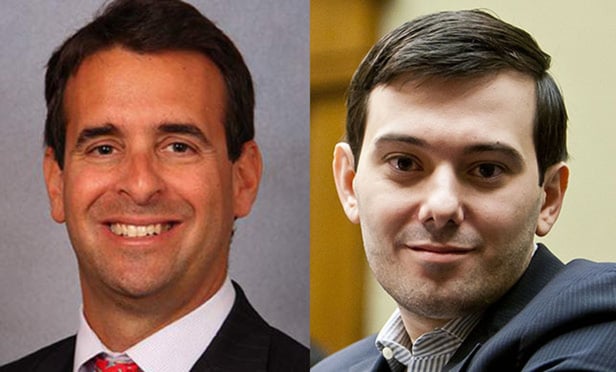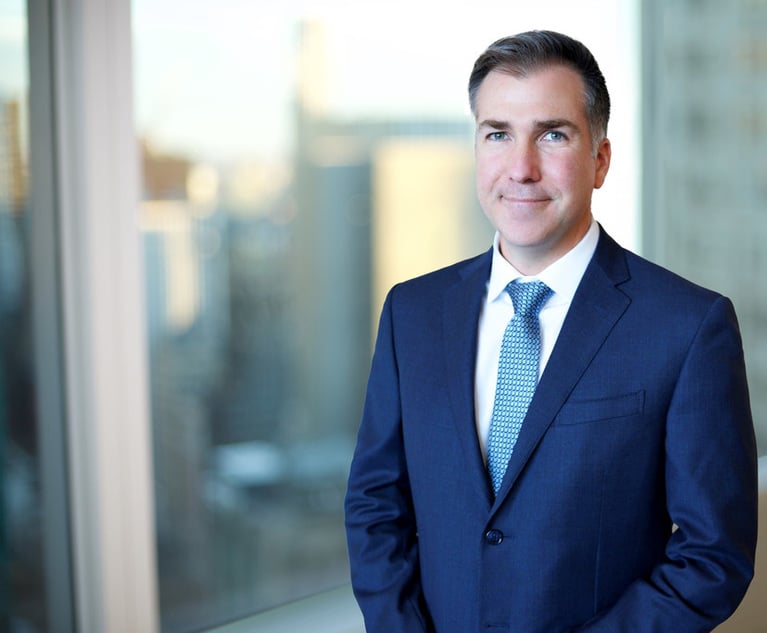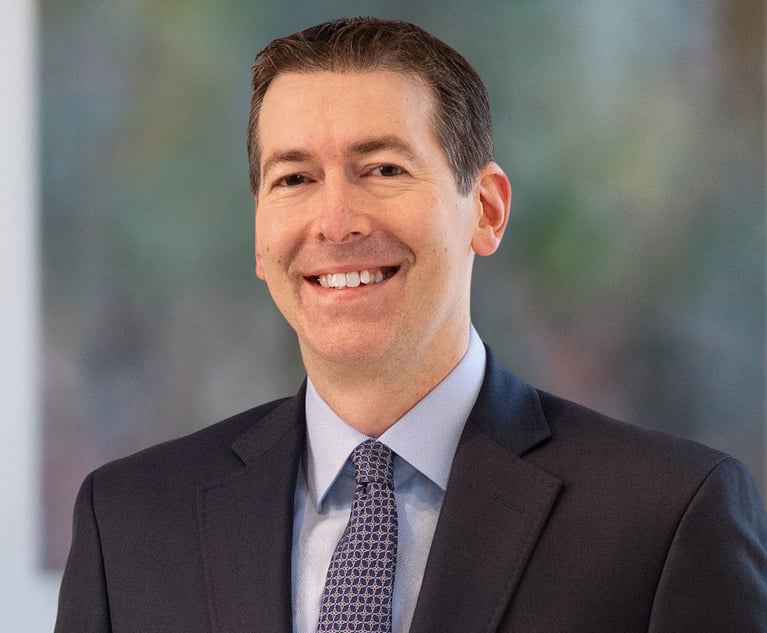Trial Against Ex-Partner Puts Spotlight on Katten Muchin
Prosecutors told jurors that former law firm partner Evan Greebel agreed to help ex-pharmaceutical executive Martin Shkreli steal money because Greebel was “eager for more business.”
October 20, 2017 at 04:22 PM
24 minute read
 Evan Greebel, left, and Martin Shkreli.
Evan Greebel, left, and Martin Shkreli. Prosecutors opened their case against former law firm partner Evan Greebel on Friday by telling jurors that he agreed to help former pharmaceutical executive Martin Shkreli steal money because he was “eager for more business.”
Greebel's lawyers countered that Shkreli had duped him, saying prosecutors were building a case based on “guilt by association.”
As the trial began, both sides also turned jurors' attention toward Katten Muchin & Rosenman, Greebel's former law firm. The government and defense repeatedly discussed Greebel's compensation arrangements at Katten Muchin, while Greebel's attorneys said he worked with several other Katten Muchin partners who handled Shkreli matters.
The case against Greebel marks a rare instance in which the government pursues a criminal case against a law firm partner after convicting the company's CEO.
Greebel was outside counsel to pharmaceutical company Retrophin, where Shkreli was CEO until 2014. After being arrested in late 2015, Greebel and Shkreli were charged together in two counts: conspiracy to commit wire fraud related to Retrophin and conspiracy to commit securities fraud related to Retrophin shares.
Greebel was a Katten Muchin partner at the time of the alleged conduct, but joined Kaye Scholer in mid-2015. He resigned from Kaye Scholer's partnership shortly after his arrest.
Shkreli, in a separate trial, was convicted on Aug. 4 of three counts, including securities fraud.
Prosecutors claim that Shkreli and Greebel engaged in a scheme to defraud Retrophin by misappropriating Retrophin's assets in an effort to pay off Shkreli's debts, including obligations he owed to investors in his former hedge funds. The government also argues Greebel agreed to help Shkreli and others illegally control the trading and price of Retrophin stock.
Assistant U.S. Attorney David Kessler told jurors on Friday that when a client hires a lawyer, “you trust that lawyer to look after you,” adding “this case is about a lawyer who betrayed that trust.”
Kessler painted Greebel as Shkreli's “right-hand man.” By 2011, Greebel was a partner at Katten making $300,000 and “he wanted more,” Kessler said. “Eager for more business,” Greebel agreed to do work for Shkreli, Kessler said.
But instead of using his legal skills to help Retrophin, Kessler said, “he agreed to help steal millions of dollars” from Retrophin.
Describing the wire fraud conspiracy charge in detail, Kessler told jurors that Greebel and Shkreli “hatched a plan” to pay back investors who were owed money by creating fraudulent consulting and settlement agreements from Retrophin, even though Retrophin didn't owe the investors money.
Elaborating on the securities fraud conspiracy charge also facing Greebel, Kessler said Greebel and Shkreli again concocted a plan to control trading of certain shares of Retrophin, a scheme involving filing false documents to regulators.
And within a few years after being introduced to Shkreli, Greebel had become the single highest income partner at Katten, Kessler said, promising that testimony would show how much money Greebel was making by working with Shkreli. “He used his legal skills to help commit the crime,” Kessler said.
Within minutes of Kessler ending his statement, Gibson, Dunn & Crutcher partner and lead defense lawyer Reed Brodsky rose from his chair to proclaim to jurors, “There was no betrayal of trust here,” adding Shkreli deceived Greebel.
“Evan was victimized,” he said.
Brodsky sought to persuade jurors that Greebel was nothing like Shkreli. “This is Evan's trial, not Shkreli's,” Brodsky said. “There was a rush to judgment here. Evan was swept up as a result of that effort to go after Mr. Shkreli.”
Brodsky told jurors that Shkreli hid his fraud from Greebel, clients have a duty to be honest with their lawyers and lawyers take what they say is true.
Brodsky acknowledged that Greebel was “not always perfect,” but said Greebel made judgment calls. “That's not a crime,” Brodsky said.
Elaborating on Greebel's defense, Brodsky said the settlement agreements were in the best interests of Retrophin and they were disclosed in public filings, while the consulting agreements were with “real consultants” and were even negotiated by other lawyers. Brodsky said there's zero evidence of manipulation of Retrophin shares.
Firm Fees in Focus
Addressing Katten, Brodsky said Greebel worked with hundreds of other lawyers at the firm, describing it as “one of the most prestigious law firms in the world.” But Greebel wasn't an equity partner, so Retrophin's fees were not going to his pockets, Brodsky told jurors.
Evidence will show, Brodsky said, that some people who worked less than Greebel and who brought in less business still made more money. “There was no formula,” he added.
Jurors may see emails from Greebel to Shkreli asking for $100,000 in fees, Brodsky prepared jurors. But Katten partners were told every year to collect fees from their clients, and firms “can't keep the lights on” if they don't collect the bills, Brodsky said.
And, he told jurors, “it doesn't make sense” for Greebel to commit a crime “for a guy who is not even paying his bills.” While Katten actually billed about $9 million for Retrophin and Shkreli's hedge fund entities, the firm collected between $5 and $6 million, Gibson Dunn has said in court papers.
Brodsky repeatedly referred to, but didn't name, other Katten attorneys on Shkreli matters, including a “prominent litigation partner” at Katten who worked on a Retrophin agreement, a former federal prosecutor at Katten who handled an SEC investigation and two “senior litigation partners” who handed a lawsuit against an adversary of Shkreli.
Right after openings, the government called to the witness stand Bernadette Herward Davida, a former Katten partner who is now a shareholder at Polsinelli and who walked the jury through a retention agreement between a Shkreli hedge fund and the firm.
Other Katten witnesses may be testifying soon. Besides Davida, the parties have expressed an interest in calling up to five Katten partners as well as a member of the firm's accounting department.
Michael Verde, Katten deputy counsel, declined to comment about the statements on Friday, saying the firm would not be providing a running commentary during trial. “We don't want to be an unsworn rebuttal witness for anyone here,” he said.
 Evan Greebel, left, and Martin Shkreli.
Evan Greebel, left, and Martin Shkreli. Prosecutors opened their case against former law firm partner Evan Greebel on Friday by telling jurors that he agreed to help former pharmaceutical executive Martin Shkreli steal money because he was “eager for more business.”
Greebel's lawyers countered that Shkreli had duped him, saying prosecutors were building a case based on “guilt by association.”
As the trial began, both sides also turned jurors' attention toward
The case against Greebel marks a rare instance in which the government pursues a criminal case against a law firm partner after convicting the company's CEO.
Greebel was outside counsel to pharmaceutical company Retrophin, where Shkreli was CEO until 2014. After being arrested in late 2015, Greebel and Shkreli were charged together in two counts: conspiracy to commit wire fraud related to Retrophin and conspiracy to commit securities fraud related to Retrophin shares.
Greebel was a
Shkreli, in a separate trial, was convicted on Aug. 4 of three counts, including securities fraud.
Prosecutors claim that Shkreli and Greebel engaged in a scheme to defraud Retrophin by misappropriating Retrophin's assets in an effort to pay off Shkreli's debts, including obligations he owed to investors in his former hedge funds. The government also argues Greebel agreed to help Shkreli and others illegally control the trading and price of Retrophin stock.
Assistant U.S. Attorney David Kessler told jurors on Friday that when a client hires a lawyer, “you trust that lawyer to look after you,” adding “this case is about a lawyer who betrayed that trust.”
Kessler painted Greebel as Shkreli's “right-hand man.” By 2011, Greebel was a partner at Katten making $300,000 and “he wanted more,” Kessler said. “Eager for more business,” Greebel agreed to do work for Shkreli, Kessler said.
But instead of using his legal skills to help Retrophin, Kessler said, “he agreed to help steal millions of dollars” from Retrophin.
Describing the wire fraud conspiracy charge in detail, Kessler told jurors that Greebel and Shkreli “hatched a plan” to pay back investors who were owed money by creating fraudulent consulting and settlement agreements from Retrophin, even though Retrophin didn't owe the investors money.
Elaborating on the securities fraud conspiracy charge also facing Greebel, Kessler said Greebel and Shkreli again concocted a plan to control trading of certain shares of Retrophin, a scheme involving filing false documents to regulators.
And within a few years after being introduced to Shkreli, Greebel had become the single highest income partner at Katten, Kessler said, promising that testimony would show how much money Greebel was making by working with Shkreli. “He used his legal skills to help commit the crime,” Kessler said.
Within minutes of Kessler ending his statement,
“Evan was victimized,” he said.
Brodsky sought to persuade jurors that Greebel was nothing like Shkreli. “This is Evan's trial, not Shkreli's,” Brodsky said. “There was a rush to judgment here. Evan was swept up as a result of that effort to go after Mr. Shkreli.”
Brodsky told jurors that Shkreli hid his fraud from Greebel, clients have a duty to be honest with their lawyers and lawyers take what they say is true.
Brodsky acknowledged that Greebel was “not always perfect,” but said Greebel made judgment calls. “That's not a crime,” Brodsky said.
Elaborating on Greebel's defense, Brodsky said the settlement agreements were in the best interests of Retrophin and they were disclosed in public filings, while the consulting agreements were with “real consultants” and were even negotiated by other lawyers. Brodsky said there's zero evidence of manipulation of Retrophin shares.
Firm Fees in Focus
Addressing Katten, Brodsky said Greebel worked with hundreds of other lawyers at the firm, describing it as “one of the most prestigious law firms in the world.” But Greebel wasn't an equity partner, so Retrophin's fees were not going to his pockets, Brodsky told jurors.
Evidence will show, Brodsky said, that some people who worked less than Greebel and who brought in less business still made more money. “There was no formula,” he added.
Jurors may see emails from Greebel to Shkreli asking for $100,000 in fees, Brodsky prepared jurors. But Katten partners were told every year to collect fees from their clients, and firms “can't keep the lights on” if they don't collect the bills, Brodsky said.
And, he told jurors, “it doesn't make sense” for Greebel to commit a crime “for a guy who is not even paying his bills.” While Katten actually billed about $9 million for Retrophin and Shkreli's hedge fund entities, the firm collected between $5 and $6 million,
Brodsky repeatedly referred to, but didn't name, other Katten attorneys on Shkreli matters, including a “prominent litigation partner” at Katten who worked on a Retrophin agreement, a former federal prosecutor at Katten who handled an SEC investigation and two “senior litigation partners” who handed a lawsuit against an adversary of Shkreli.
Right after openings, the government called to the witness stand Bernadette Herward Davida, a former Katten partner who is now a shareholder at
Other Katten witnesses may be testifying soon. Besides Davida, the parties have expressed an interest in calling up to five Katten partners as well as a member of the firm's accounting department.
Michael Verde, Katten deputy counsel, declined to comment about the statements on Friday, saying the firm would not be providing a running commentary during trial. “We don't want to be an unsworn rebuttal witness for anyone here,” he said.
This content has been archived. It is available through our partners, LexisNexis® and Bloomberg Law.
To view this content, please continue to their sites.
Not a Lexis Subscriber?
Subscribe Now
Not a Bloomberg Law Subscriber?
Subscribe Now
NOT FOR REPRINT
© 2025 ALM Global, LLC, All Rights Reserved. Request academic re-use from www.copyright.com. All other uses, submit a request to [email protected]. For more information visit Asset & Logo Licensing.
You Might Like
View All
Attorneys ‘On the Move’: O’Melveny Hires Former NBA Vice President; MoFo Adds Venture Capital Partner
5 minute read
Orrick Hires Longtime Weil Partner as New Head of Antitrust Litigation

Ephemeral Messaging Going Into 2025: The Messages May Vanish but Not the Preservation Obligations
5 minute read
Trending Stories
- 1Conspiracy Suits Against Quinn Emanuel, Roc Nation Moved to Federal District Court
- 2'Knowledge of Mismatch:' Fed Judge Offers Guidance on How to Hold Banks Accountable for Erroneous Transfers
- 3PAGA Claims Must Now Be 'Headed'
- 4Million-Dollar Verdict: Broward Jury Sides With Small Business
- 5'Reluctant to Trust'?: NY Courts Continue to Grapple With Complexities of Jury Diversity
Who Got The Work
J. Brugh Lower of Gibbons has entered an appearance for industrial equipment supplier Devco Corporation in a pending trademark infringement lawsuit. The suit, accusing the defendant of selling knock-off Graco products, was filed Dec. 18 in New Jersey District Court by Rivkin Radler on behalf of Graco Inc. and Graco Minnesota. The case, assigned to U.S. District Judge Zahid N. Quraishi, is 3:24-cv-11294, Graco Inc. et al v. Devco Corporation.
Who Got The Work
Rebecca Maller-Stein and Kent A. Yalowitz of Arnold & Porter Kaye Scholer have entered their appearances for Hanaco Venture Capital and its executives, Lior Prosor and David Frankel, in a pending securities lawsuit. The action, filed on Dec. 24 in New York Southern District Court by Zell, Aron & Co. on behalf of Goldeneye Advisors, accuses the defendants of negligently and fraudulently managing the plaintiff's $1 million investment. The case, assigned to U.S. District Judge Vernon S. Broderick, is 1:24-cv-09918, Goldeneye Advisors, LLC v. Hanaco Venture Capital, Ltd. et al.
Who Got The Work
Attorneys from A&O Shearman has stepped in as defense counsel for Toronto-Dominion Bank and other defendants in a pending securities class action. The suit, filed Dec. 11 in New York Southern District Court by Bleichmar Fonti & Auld, accuses the defendants of concealing the bank's 'pervasive' deficiencies in regards to its compliance with the Bank Secrecy Act and the quality of its anti-money laundering controls. The case, assigned to U.S. District Judge Arun Subramanian, is 1:24-cv-09445, Gonzalez v. The Toronto-Dominion Bank et al.
Who Got The Work
Crown Castle International, a Pennsylvania company providing shared communications infrastructure, has turned to Luke D. Wolf of Gordon Rees Scully Mansukhani to fend off a pending breach-of-contract lawsuit. The court action, filed Nov. 25 in Michigan Eastern District Court by Hooper Hathaway PC on behalf of The Town Residences LLC, accuses Crown Castle of failing to transfer approximately $30,000 in utility payments from T-Mobile in breach of a roof-top lease and assignment agreement. The case, assigned to U.S. District Judge Susan K. Declercq, is 2:24-cv-13131, The Town Residences LLC v. T-Mobile US, Inc. et al.
Who Got The Work
Wilfred P. Coronato and Daniel M. Schwartz of McCarter & English have stepped in as defense counsel to Electrolux Home Products Inc. in a pending product liability lawsuit. The court action, filed Nov. 26 in New York Eastern District Court by Poulos Lopiccolo PC and Nagel Rice LLP on behalf of David Stern, alleges that the defendant's refrigerators’ drawers and shelving repeatedly break and fall apart within months after purchase. The case, assigned to U.S. District Judge Joan M. Azrack, is 2:24-cv-08204, Stern v. Electrolux Home Products, Inc.
Featured Firms
Law Offices of Gary Martin Hays & Associates, P.C.
(470) 294-1674
Law Offices of Mark E. Salomone
(857) 444-6468
Smith & Hassler
(713) 739-1250






